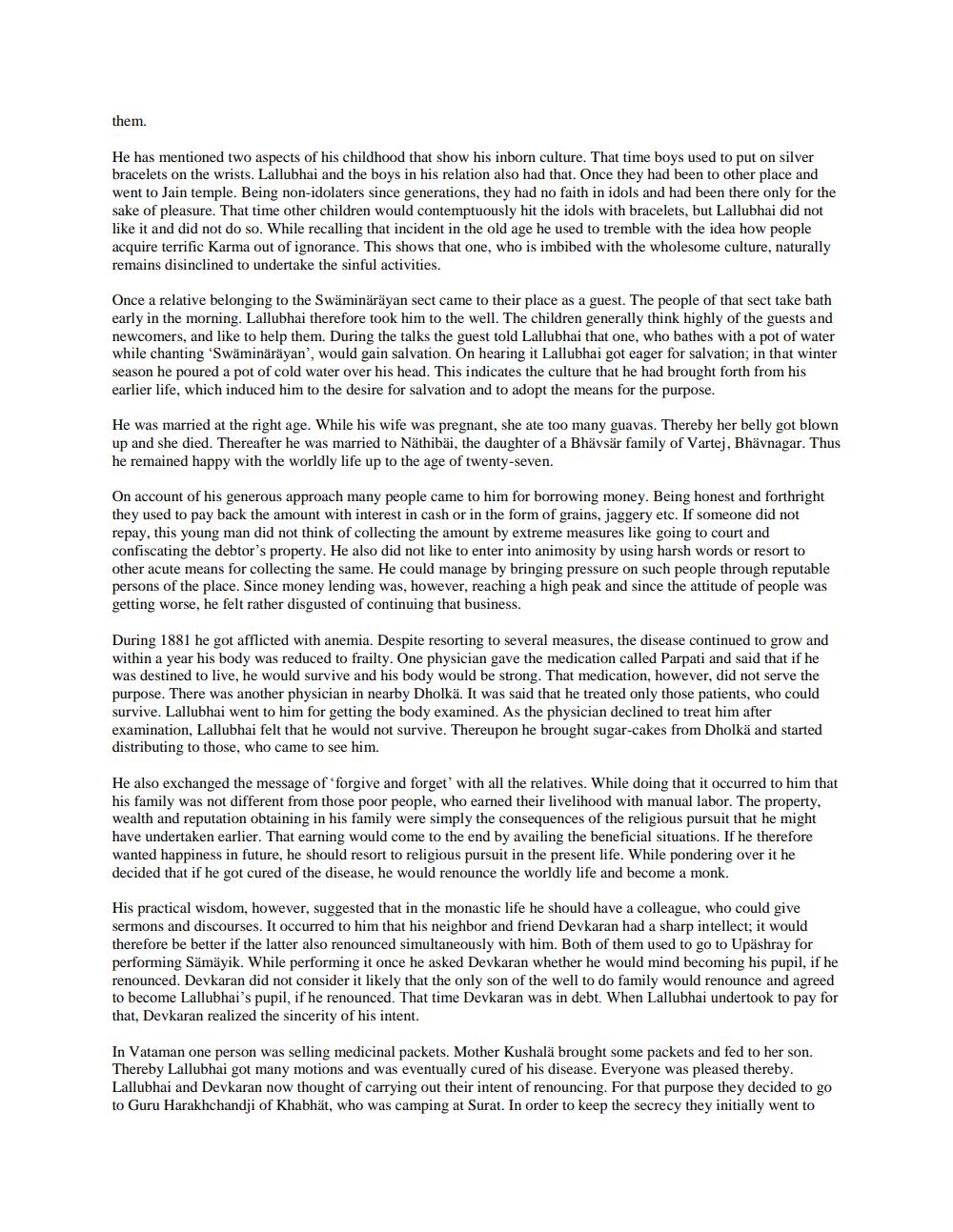Book Title: Laghurajswami Biography Author(s): Manu Doshi Publisher: Manu Doshi View full book textPage 3
________________ them. He has mentioned two aspects of his childhood that show his inborn culture. That time boys used to put on silver bracelets on the wrists. Lallubhai and the boys in his relation also had that. Once they had been to other place and went to Jain temple. Being non-idolaters since generations, they had no faith in idols and had been there only for the sake of pleasure. That time other children would contemptuously hit the idols with bracelets, but Lallubhai did not like it and did not do so. While recalling that incident in the old age he used to tremble with the idea how people acquire terrific Karma out of ignorance. This shows that one, who is imbibed with the wholesome culture, naturally remains disinclined to undertake the sinful activities. Once a relative belonging to the Swäminäräyan sect came to their place as a guest. The people of that sect take bath early in the morning. Lallubhai therefore took him to the well. The children generally think highly of the guests and newcomers, and like to help them. During the talks the guest told Lallubhai that one, who bathes with a pot of water while chanting Swäminäräyan', would gain salvation. On hearing it Lallubhai got eager for salvation; in that winter season he poured a pot of cold water over his head. This indicates the culture that he had brought forth from his earlier life, which induced him to the desire for salvation and to adopt the means for the purpose. He was married at the right age. While his wife was pregnant, she ate too many guavas. Thereby her belly got blown up and she died. Thereafter he was married to Näthibäi, the daughter of a Bhävsär family of Vartej, Bhavnagar. Thus he remained happy with the worldly life up to the age of twenty-seven. On account of his generous approach many people came to him for borrowing money. Being honest and forthright they used to pay back the amount with interest in cash or in the form of grains, jaggery etc. If someone did not repay, this young man did not think of collecting the amount by extreme measures like going to court and confiscating the debtor's property. He also did not like to enter into animosity by using harsh words or resort to other acute means for collecting the same. He could manage by bringing pressure on such people through reputable persons of the place. Since money lending was, however, reaching a high peak and since the attitude of people was getting worse, he felt rather disgusted of continuing that business. During 1881 he got afflicted with anemia. Despite resorting to several measures, the disease continued to grow and within a year his body was reduced to frailty. One physician gave the medication called Parpati and said that if he was destined to live, he would survive and his body would be strong. That medication, however, did not serve the purpose. There was another physician in nearby Dholkä. It was said that he treated only those patients, who could survive. Lallubhai went to him for getting the body examined. As the physician declined to treat him after examination, Lallubhai felt that he would not survive. Thereupon he brought sugar-cakes from Dholkä and started distributing to those, who came to see him. He also exchanged the message of 'forgive and forget' with all the relatives. While doing that it occurred to him that his family was not different from those poor people, who earned their livelihood with manual labor. The property, wealth and reputation obtaining in his family were simply the consequences of the religious pursuit that he might have undertaken earlier. That earning would come to the end by availing the beneficial situations. If he therefore wanted happiness in future, he should resort to religious pursuit in the present life. While pondering over it he decided that if he got cured of the disease, he would renounce the worldly life and become a monk. His practical wisdom, however, suggested that in the monastic life he should have a colleague, who could give sermons and discourses. It occurred to him that his neighbor and friend Devkaran had a sharp intellect; it would therefore be better if the latter also renounced simultaneously with him. Both of them used to go to Upäshray for performing Sämäyik. While performing it once he asked Devkaran whether he would mind becoming his pupil, if he renounced. Devkaran did not consider it likely that the only son of the well to do family would renounce and agreed to become Lallubhai's pupil, if he renounced. That time Devkaran was in debt. When Lallubhai undertook to pay for that, Devkaran realized the sincerity of his intent. In Vataman one person was selling medicinal packets. Mother Kushalä brought some packets and fed to her son. Thereby Lallubhai got many motions and was eventually cured of his disease. Everyone was pleased thereby. Lallubhai and Devkaran now thought of carrying out their intent of renouncing. For that purpose they decided to go to Guru Harakhchandji of Khabhät, who was camping at Surat. In order to keep the secrecy they initially went toPage Navigation
1 2 3 4 5 6 7 8 9 10 11 12 13 14 15 16 17 18 19 20 21 22 23 24 25 26 27 28 29 30 31 32 ... 49
